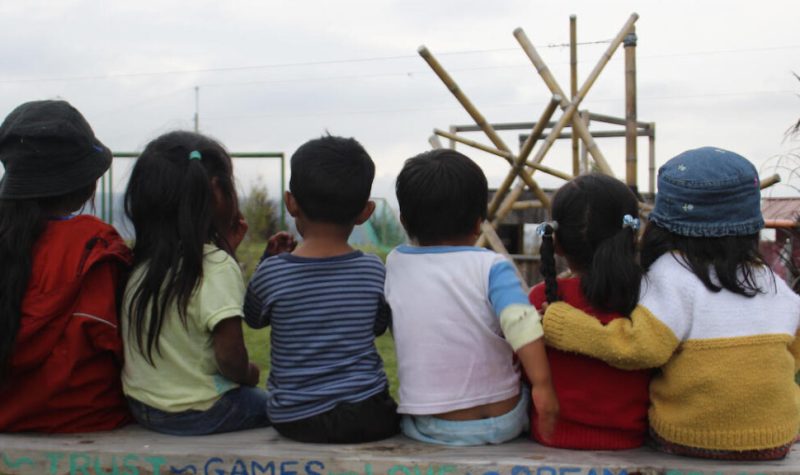By Manda Aufochs Gillespie
I first started taking my children to Guatemala when they were just one and five. It was an idea born on Cortes where two of my friends announced they were going to spend three or four months with their adopted son, so he'd have a chance to get better acquainted with this part of his heritage. Two of the first friends I met after moving to Canada had themselves just moved there to start a Children's Village and I was excited to visit them. So, suddenly, I was moving to Guatemala for fourth months without my husband and without knowing enough Spanish to do more than order “Uno taco por favor.”
Heather Knox and Greg Kemp
By the time we arrived at our friends Children Village, less than a year after they had uprooted themselves from their basement apartment in Vancouver where she'd worked for the Folk Festival and he had worked construction, the Children's Village already had two homes, organic gardens, and a wood fired pizza oven. The project innovated a type of earth-bag construction nearly earthquake proof, something extremely important in Guatemala where small earthquakes routinely causes the cinder block houses to shake apartment onto inhabitants. They also had begun using other innovative techniques: plastic bottle walls (a cheap building material that also helps deal with the overwhelming plastic garbage problem), solar panels, rain catchment, permaculture techniques, food trees, micro enterprise development, and provided therapy, health and dental support, food, skill training, and education for the children and mothers they helped over the years. It was nearly unbelievable how much they had accomplish in such a short time. But that's the thing about Heather and Greg , they were used to working hard and they believe in the power of “leveraging their Canadian privilege.”
Somos Children's Village
Over the years they've continued to build and expand the project and have helped dozens of women and their children get back on their feet through providing housing, training, therapy, food, and education. They've invested in the local school and community and through their location have created the only public lending library, investing in computers, farm-to-table growing and cooking programs, the only playground, work opportunities, and more. These programs have been supported by the13 buildings they built — all run off solar, which they also built — and an organic farm — which they also built from the soil up — and has hosted 500 volunteers. When COVID hit they were providing food and educational support or primary education to 55 kids daily and had long term volunteers there from five countries and a volunteer group of a singer song writer and her fans on their way.
How Privileged We Are
It's easy to forget just how privileged we are in North America. Even those who aren't born wealthy or don't live in the upper middle class, have so very much privilege. Visiting Guatemala helped me to feel that for myself and for my children to begin to understand it. After our first stay there, we came home to a new rental apartment. My children ran from tap to tap exclaiming: “we can drink it?” Clean water on demand: what a miracle and how easy we forget its value when we live in North America and can take it for granted.
Guatemala
Guatemala is the second poorest country in the Western Hemisphere and one where 15 million people, 7 million are undernourished and many are malnourished. In 2011, the average person only had 4.1 years of schooling, 25.5% of the population are illiterate, with illiteracy rates up to more than 60% in the indigenous population, which constitutes 51% of the entire population. It's a stark country with all that poverty and deprivation set amidst the kind of beauty that those in BC are quite familiar with their 37 volcanoes, three still active; gorgeous — and extremely deep — lakes; ocean front; jungle; Mayan ruins; and historic cities like Antiqua.
Visiting Guatemala
In the years that I was visiting Guatemala, I made a few close friends including a woman that lived with me for many months over the years. Veronica nor anyone in her family ever had a bank account, most of her seven siblings still lived in the family house, even the ones with kids, and she shared a bedroom (with only two beds) with her mother and two, sometimes three, sisters. And they were doing well relative to most. The stories from Project Somos of the women and children that they helped over the years are brutal: a woman and her children living in a dog kennel, eight year old children working in button factories, young girls never allowed to go to school at all. Most have never seen a book, none had ever seen kale, and certainly they never knew the experience of toys and a playground and the love and kindness of a preschool teacher. Yet,
With the advent of COVID-19, I've been worried about my friends in Guatemala and all those that rely on Project Somos. Guatemala has been on complete lock-down and in a country where so many people already live in poverty and malnourished, they are now facing a famine that will almost certainly kill far more than the disease itself.
Project Somos has managed to support over 500 families during the pandemic. They've managed to survive these desperate times, in part, because they have always relied on Canadians and Americans like them: people who've understood that though they may not have a lot, that small donations to projects like Project Somos (projects with virtually no overhead) can go a long way. With all of their usual fundraising efforts, all their travel, and all their voluntourism projects canceled, there is still a lot of need. And every day more people come to them as the last hope between them and starvation.
To learn more about Heather and Greg and Project Somos visit ProjectSomos.org and listen to the podcast.











